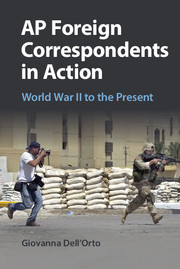Book contents
- Frontmatter
- Dedication
- Contents
- List of Figures
- Acknowledgments
- 1 Introduction
- 2 Getting Ready, Getting Started, and Getting Lost in Translation
- 3 What's the Story? News Judgment, News Pitches
- 4 Getting to the Sources (and Keeping Them Alive)
- 5 Being an American Abroad – Perceptions of Journalists
- 6 Eyewitness Reporting: Getting to the Scene
- 7 The Costs of Being There to Count the Bodies
- 8 Your Byline Today, Mine Tomorrow: Teamwork and Competition
- 9 Access, Censorship, and Spin: Relating with Foreign Governments
- 10 Flacks, Spooks, GIs, and Objective Journalists: Relating with the U.S. Government Abroad
- 11 Getting It Out, Getting It Edited: Filing News, Working with the Desk
- 12 The Evolving Milkmen: Writing for an Audience
- 13 Purpose and Influence of Foreign Correspondence
- 14 Eight Decades of Bearing Witness and Telling the World's Stories: Conclusions
- Bibliography
- Index
1 - Introduction
Published online by Cambridge University Press: 05 November 2015
- Frontmatter
- Dedication
- Contents
- List of Figures
- Acknowledgments
- 1 Introduction
- 2 Getting Ready, Getting Started, and Getting Lost in Translation
- 3 What's the Story? News Judgment, News Pitches
- 4 Getting to the Sources (and Keeping Them Alive)
- 5 Being an American Abroad – Perceptions of Journalists
- 6 Eyewitness Reporting: Getting to the Scene
- 7 The Costs of Being There to Count the Bodies
- 8 Your Byline Today, Mine Tomorrow: Teamwork and Competition
- 9 Access, Censorship, and Spin: Relating with Foreign Governments
- 10 Flacks, Spooks, GIs, and Objective Journalists: Relating with the U.S. Government Abroad
- 11 Getting It Out, Getting It Edited: Filing News, Working with the Desk
- 12 The Evolving Milkmen: Writing for an Audience
- 13 Purpose and Influence of Foreign Correspondence
- 14 Eight Decades of Bearing Witness and Telling the World's Stories: Conclusions
- Bibliography
- Index
Summary
They have had lamb chops with Pope John Paul II, tea with Osama bin Laden's bodyguard, pizza with Fidel Castro, and canned tuna with Zapatista fighters. The world's most and least powerful have alternately tried to cajole and evade them. They have been bombed, kidnapped, held at gunpoint, and have come under all kinds of fire from Beirut to Khost, Afghanistan, to Tamaulipas, Mexico. They have filed all continents’ major stories – from U.S. warships, on keyboards shaking during record earthquakes, and by thrusting film and papers at random passengers in airports’ international departure lounges whom they deemed trustworthy enough to become “pigeons.”
Anybody who has followed foreign news in U.S. media over the past eight decades is certain to have read their stories – and most likely not to know their names, or anything else about them. These global news agenda-setters are the foreign correspondents of The Associated Press, the most significant unknown shapers of Americans’ worldview. How they have brought the world to America from the 1940s to today is the core of this book – providing not only an entirely new firsthand history of the major sociopolitical junctures of the 20th and 21st centuries, but shedding new light on the connection between journalism and international affairs at a time of turmoil for both.
With the end of the Cold War paradigm, the splintering of the “war on terror,” and profound, insularity-inducing economic trouble, American foreign policy in the mid-2010s appears to be struggling to define its priorities and direction in a world bursting with violence. U.S. news media – facing a crisis that, far from being simply a failure of traditional business models and platforms, is threatening the very existence of a mediated public sphere – are increasingly disengaging from international coverage. Assuming that foreign correspondence helps frame the box within which ordinary Americans and policymakers alike think of the world, and therefore delimits the range of possible foreign policy options, today's disengagement is both paradoxical and dangerous.
It also highlights the growing importance of the news organization that provides the bulk of foreign news to the American public (and beyond) – The Associated Press.
- Type
- Chapter
- Information
- AP Foreign Correspondents in ActionWorld War II to the Present, pp. 1 - 18Publisher: Cambridge University PressPrint publication year: 2015



